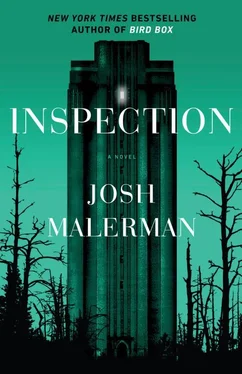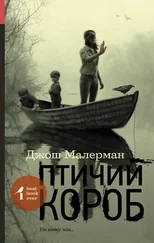Before J could defend himself, the bell rang and the cooks appeared with trays of waffles, eggs, fruits, and vegetables. As each boy was served, Q spoke of the merits of fruit in the morning and F pretended to hide his food from W. But J didn’t feel hungry anymore.
J was thinking about lies.
The train of thought was so profound that he found himself replaying exactly what D.A.D. had said in the Check-Up room. I’ve just had a wonderful idea. How about if I manufacture a means by which you can tell me your thoughts, your feelings, directly. Something we can share, just you and I. A notebook perhaps. You take notes and…deliver them to me. Why, we could be pen pals in that way.
Not quite a lie after all. Technically, D.A.D. hadn’t said it was just for him.
Yet, just you and I…
Surely J had it wrong. A word here, a word there, and the meaning of a thing could change so much. Luxley talked about that in one of his books. J couldn’t tell if he felt relief at the idea of D.A.D. blurring the truth or if it scared him more deeply than the idea of that vague door in the basement. Was that door below him now? Below the very chair in which he sat?
“Eat up, J,” F said. “Or W is gonna leap across the table.”
“I just might,” W said. The way he said it, J couldn’t help but feel like W was angry with him. As if the large boy was reminding him that he’d implied something wrong. Terribly wrong.
J poked at his food until he ate it. Until he realized, for the first time in his young life, that it was possible to carry on, to eat and to sleep, to talk and perhaps to even study, as the world around him…changed.
“Heck of a speech,” F said. “Luxley must have written it.”
“Luxley doesn’t write the speeches,” D said.
“Oh? How do you know that?” J asked.
D shrugged. “You can tell. They don’t have the same energy.”
F flailed his hands in the air. “Would you listen to you two? One implies D.A.D. lied to him and the other says Lawrence Luxley has more energy than our father! Maybe the coming floor shift is a good thing. You guys could use splitting up.”
He laughed, but J and D looked at one another across the table.
“I didn’t say he lied,” J reiterated. “Don’t even say something like that. I’m sure I just…” He paused. “I had it wrong. He didn’t say what I thought he said.”
“No kidding!” L said. “Now, can we move on?”
They did. J ate to the rhythm of the other boys discussing Lawrence Luxley and Professors Gulch and Kinney. Yellow Ball and Film Night. He ate to the uneven beat of his own thoughts as well, as his own words played out— I didn’t say he lied, I didn’t say he lied— at odds with the equally rhythmic rebuttal:
But I think he might have.
Warren Bratt and Lawrence Luxley
Richard could do everything in his power to make the basement more comfortable for Warren, but in the end it would still be a basement. And the truth was, Richard had . He’d ordered the carpenters to swap out the carpet, hang better pictures on the walls, renovate the storage rooms, realign the shelves, and muffle the boiler, repaint the doors, install a new toilet. Hell, Richard had even sent him flowers. They stood now in murky water upon Warren’s writing desk, equidistant between Gordon and Warren, as the writer received his weekly earful on how to write a book from a man who certainly didn’t know how.
“Richard isn’t asking for anything from your soul, Warren. I think you know that.” Gordon wore his trademark fine suit. The way he sat half upon Warren’s desk drove him insane. “He’s not interested in the tangle of emotion and epiphany that no doubt swirls in your belly. To be brutally honest with you, Warren, he’s not interested in your artistry at all.”
Warren, hefty and sweating, standing beside his chair, tried to maintain a look of professional ambiguity. But it was hard. Gordon spoke to him on Richard’s behalf like he spoke to all the Parenthood staff: as if Warren Bratt, a.k.a. Lawrence Luxley, were a child. Younger somehow than even the boys. “If you ever find that you are blocked, just remind yourself that he’s not looking for the great American novel. He’s not even looking for the great Antarctic novel. He’s looking for a book. A bad book will do. In fact, a bad book will do better than a good one. You know this. You’ve written twenty-nine of them already.”
“Thank you, Gordon. Thank you very much.”
For a decade, Warren had considered these meetings to be the most difficult part of his job. But recently something much worse had come up.
The Guilts, he’d called it.
It was a dangerous emotion for a staff member of the Parenthood to experience. He could hardly admit to himself what it was for. But really, there was no hiding it, as the source operated above him in the many floors of the Turret, day in, day out.
Guilt, yes, for how they were raising these boys.
Shut up, Warren thought now, Gordon so close. He half-imagined an Inspector bringing a magnifying glass to his ear, proclaiming him unclean.
The Guilts.
The feeling was only a splinter now, but not long ago it had only been a sliver.
Gordon smiled and Warren felt the familiar rush of rage in his chest, his blood, his bones. Gordon had a way of smiling that suggested you agreed with him in the end, no matter how ridiculous a thing he had proposed. And Warren, like the rest of the Parenthood, complied. Smiled back. Beyond the white door of Warren’s basement office, the subterranean halls of the Parenthood wound like catacombs. And while the boiler had been quieted some, Richard had no plans to turn down the volume of the Corner.
“What are you thinking for the next book?” The way Gordon asked it was nothing like Warren’s old pals, the Writing Gangsters, used to ask it at Don Don’s pub in Milwaukee. In those days, Warren’s equally idealistic cohorts had to blow their purple-dyed bangs from their eyes before they could look into his, usually flexing a tattoo or two for good measure. And if ever they asked after a book idea, it was with genuine artistic concern. Oh, how Warren Bratt missed his pretentious, holier-than-thou, degenerate former friends.
But those days were ten years past. And Warren’s gut wasn’t the only thing that had grown in that time. The Alphabet Boys were almost teenagers now. He’d watched them grow up in real time. Knowing what they knew. And what they didn’t.
The Guilts, indeed.
“I’m not sure yet,” he said purposefully. It felt good to make the corporate suck-up squirm. Corner hum or not, once a punk always a poker, and Warren Bratt had to stick it to Gordon anytime he could. Of course he had an idea for the next book. He had one thousand ideas for the next one thousand books. Because Richard, the Alphabet Boys’ magnanimous D.A.D., wasn’t looking for, as Gordon just said, a work of art. Most decidedly not. Richard wanted supermarket slop. The kind of books that Warren’s aunts used to slurp up on the beaches of the Wisconsin Dells. The kind of books that showed half-naked men clutching half-naked women, their lust as clearly stated as their loins.
Except…no women in these books. Oh no.
“Let’s do this,” Gordon began. Always an idea for the next book. Always similar to the last one. “Give us something about a man who washes windows.” He snapped his fingers. Warren knew very well where this was going. The plots of the leisure books were more formulaic than the romance novels he wished he was writing instead.
Has it come to that? Warren asked himself.
But no. Not quite that. And though Warren wasn’t able to examine this feeling in whole, as Gordon sat staring at him from across his writing desk, he understood it was something like that. Something like wanting to write the worst thing he’d ever written, if only it meant not writing more of the same.
Читать дальше


![Джош Рейнольдс - Тень в пламени [Сборник]](/books/28154/dzhosh-rejnolds-ten-v-plameni-sbornik-thumb.webp)





![Джош Малерман - Мэлори [litres]](/books/388628/dzhosh-malerman-melori-litres-thumb.webp)



